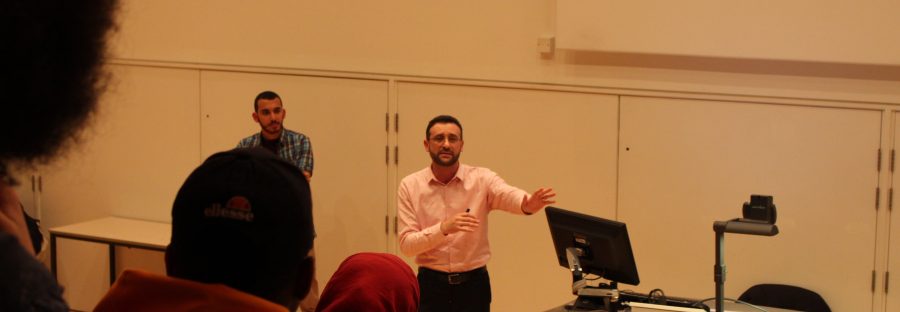Imprisoned Syrian doctor speaks out about terror of Assad’s brutal regime
- Syrian activist jailed for over two years for advocating human rights
- Tells MMU students about his experiences under Assad's rule
A Syrian doctor told an audience of students how he was imprisoned for his anti-corruption stance under Bashar Al-Assad’s rule.
Manchester-based Dr Haytham Al-Hamwi is now campaigning on behalf of the Syrian community in the UK.
In the auditorium, he recalled the circumstances that put him in prison and talked about his childhood home Darayya, a small town near Damascus now flattened by government forces.

A young Al-Hamwi had mostly apolitical intentions, cleaning up rubbish from the streets and handing out posters against smoking cigarettes.
In the early 2000s Syria saw an uprising in civil unrest dubbed the Damascus Spring, which was quickly crushed by the new Bashar Al-Assad government.
“People in the UK don’t fully understand how it is like to live in a dictatorial regime,” said Dr Al-Hamwi.
He told the MMU law school audience: “You can’t live without freedom, without human rights we are nothing.”

In 2003 Al-Hamwi and 24 others were arrested for their efforts and later subjected to three months of interrogations in a crowded prison in Damascus.
A trial followed at a secret field military court where his civil society groups violated the 1958 Association Law and was sentenced to four years in prison.
It was a difficult time, I had scabies, lice and many problems. My family had no idea where I was
He described his time in prison as dark and dismal, and was in solitary confinement for seven months in a cell deprived of sunlight.
He said: “It was a difficult time, I had scabies, lice and many problems. My family had no idea where I was and I only saw them after 10 months of my detention. I couldn’t even hug my kids at the visit”.
Dr Al-Hamwi was released from prison after a two-and-a-half year ordeal, a day he calls the “happiest day of my life”.
He is the director of the Rethink ,Rebuild Society a Manchester-based charity which advocates for Syrians to become a more effective part of British society.
Many of the discussions in the Syrian community revolve around how they can come together and achieve peace. The charity believes that in doing so the Syrian diaspora can integrate into British society.
He urged students in attendance to use their time in university to fight for a cause by participating in local events, staying updated and contacting local MPs urging UK action in Syria.
At the end of his talk, he showed images of what was once his home now devoid of life and only a rubble ghost town.


